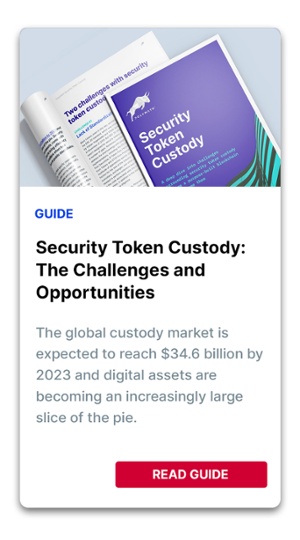Polymath: What role does custody play in enabling institutional adoption of security tokens?
Martin Kreitmair (Martin): Custody is the key to satisfying the needs of institutional players. Professional investors are usually not interested in the blockchain itself, but the products based on blockchain. Self-custody is completely out-of-scope for those investors, so there are custodians that provide services for digital assets on chain.
Digital assets on the blockchain have to fulfill the same regulatory requirements as assets stored in traditional ways. A licensed custodian can provide institutions with ready-made software solutions that allow them to offer compliant digital asset custody to their clients.
 Polymath: What challenges do organizations face in custodying security tokens, compared to traditional assets or cryptocurrencies?
Polymath: What challenges do organizations face in custodying security tokens, compared to traditional assets or cryptocurrencies?
Martin: We’re still in the early days of tokenization; it’s about at the stage e-commerce was in 1994, when Amazon was founded. Custody of security tokens has to be as easy as it is for traditional assets, and we’re not yet there. The question about how assets can be securely stored shouldn't be the focus for token holders. Whoever wants to invest in security tokens (or crypto-assets in general) should be able to do so without any knowledge of blockchain and without the need to spend several weeks preparing everything. That is the usability and value we as digital asset custodians are adding to the market by providing simplification.
Unlike traditional assets, security tokens often come with in-built technical security functionalities, yet it is still up to the custodian to develop asset-specific security solutions for all kinds of crypto-assets. That is also something investors shouldn't have to worry about.
We’re still in the early days of tokenization. Custody of security tokens has to be as easy as it is for traditional assets, and we’re not yet there.
Polymath: What do issuers need to consider when looking for a custody solution?
Martin: Generally, the custodian should be regulated, which is a very high signal of trustworthiness. Furthermore, the custodian should have been active for several years, should have a broad range of existing clients, and has to provide a scalable product. The most important aspect is trust, followed by security, scalability, and experience. The technical solution is the final aspect to address. It needs to be able to support token management.
Polymath: How do you see the role security tokens play in capital markets changing over the next five years?
Martin: Digitization will change the world of securities dramatically over the next few years. Security Tokens are the first glimpse of that change. Regulatory and technical innovation are really boosting the topic in many regions around the globe. Why would someone prefer physical securities over digital ones? They are more expensive, less liquid and not smartphone-ready. The customer base for physical securities is decreasing as younger generations are used to everything being digitally available.

